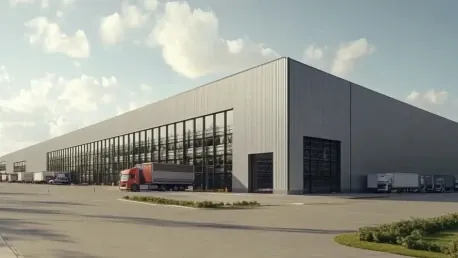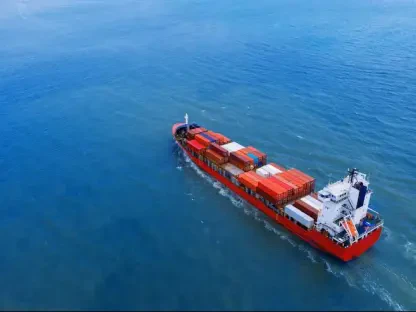The impending closure of Palletline’s logistics operation in Wrexham, North Wales, has sent shockwaves through the local community and the haulage industry. Nearly 50 jobs are at risk, and the broader economic impact could be significant for a region already facing economic challenges. This article delves into the various aspects of this closure, analyzing the perspectives of affected stakeholders and situating the issue within broader industry trends.
The Imminent Job Loss and Economic Impact
Immediate Threat to Livelihoods
The closure of Palletline Wrexham poses a direct risk to nearly 50 employees. These jobs are not just numbers; they represent 50 families and individuals whose economic stability is now in jeopardy. The local economy may face a ripple effect as these employees and their families potentially reduce their spending, leading to decreased revenue for local businesses. Individuals who have spent years building their careers within the company now face the daunting prospect of unemployment, stirring anxiety and uncertainty. Furthermore, the closure could leave a substantial gap in the logistics services available to local businesses, which rely heavily on such operations to function efficiently. In smaller communities where large employers are fewer, the disappearance of a major player like Palletline can drastically reduce disposable income circulating within the community. Local establishments such as grocery stores, restaurants, and even healthcare facilities may see a downturn in business, compounding the economic woes of an area already strained by existing economic challenges.
Long-Term Economic Outlook
Beyond the immediate job losses, the closure might have long-term repercussions for Wrexham and the surrounding areas. Small businesses that rely on logistics services could face increased costs and operational challenges. The cumulative effect of these changes could result in a less vibrant local economy, with fewer opportunities for growth and development. The logistics industry in North Wales is interlinked with various other sectors like manufacturing, retail, and agriculture, creating a network that sustains the local economy. Long-term effects of the closure could include diminished business confidence in the region, potentially deterring investment and stalling local development projects. Real estate markets might face instability as the economic uncertainty dissuades people from buying homes, causing property values to stagnate or even plummet. Moreover, the reduced logistics capacity may hinder the operational efficiency of local companies, forcing them to seek more expensive or less reliable alternatives. If new jobs are not created to offset the losses incurred by this closure, North Wales could find itself grappling with an escalating unemployment rate, posing significant challenges for policymakers and community leaders.
Palletline’s Strategic Decision
Aligning Delivery Areas
Palletline’s decision to shut down its Wrexham depot stems from a strategic realignment aimed at cutting ongoing losses. By reassessing delivery areas and reallocating the North Wales postcodes served by the Wrexham operation to other network members, Palletline seeks to optimize its logistics operations and ensure full network coverage. In a competitive and often unforgiving industry, companies must make hard decisions to sustain their market positions. For Palletline, this entails closing less profitable depots to enhance overall efficiency. This realignment could lead to streamlined services and cost efficiencies, enabling Palletline to maintain or even improve its service quality in the long run. However, for the workforce in Wrexham, this move signals the harsh reality of corporate strategies aimed at maintaining financial viability often translated into job cuts and facility closures. Reallocating the delivery zones to other depots may lead to longer routes and potentially higher operational costs elsewhere, albeit offsetting the immediate financial burden posed by the Wrexham operation.
Financial Viability and Network Strengthening
The rationale behind the closure is to return to member control where appropriate and support the growth of existing network members. This move is part of a broader effort to eliminate financial losses at specific depots, thereby improving the overall health of the company’s logistics network. While this strategy may make sense from a corporate perspective, the human and community costs are undeniable. It highlights the tension between the need for financial stability and the commitment to social responsibility. Palletline’s strategy underscores an industry-wide trend toward consolidation and optimization. By trimming operations that contribute to financial losses, the company aims to safeguard its broader network. However, such strategies are often double-edged swords. While they may shield the company’s overall financial health, they can also erode community trust and employee morale. For the Wrexham employees, the promise of securing the company’s future likely offers little comfort when faced with the immediate threat of losing their livelihoods.
Community Response and Support
Local Groups Stepping Up
Community groups, such as Loris Y Gogs/Trucks Around North Wales, have been vocal in their support for the affected drivers. These groups are not only offering emotional support but are also actively seeking ways to help the displaced workers find new employment opportunities. This collective action showcases the community’s resilience and solidarity in times of economic distress. Community-based initiatives are often crucial in providing immediate relief and longer-term solutions to those affected by large-scale job cuts. Efforts by local groups to connect affected workers with new opportunities reflect the strong community ties in North Wales. Initiatives range from job fairs to skill development programs designed to retrain and upskill the workforce, making them more adaptable to changing market demands. Such collective action not only alleviates immediate suffering but also lays the groundwork for future economic resilience, building a support system that helps the community weather economic challenges.
Mitigating the Negative Impacts
Palletline has entered a required period of consultation with affected employees, working closely with network members in the region to secure alternative employment opportunities. While this demonstrates a commitment to mitigating the closure’s negative impacts, the efficacy of these efforts remains to be seen. Despite corporate efforts, the reality of finding equivalent job opportunities in a strained local market can be daunting for workers. During consultation, proposals such as offering severance packages, assisting with job search efforts, and providing mental health support are typically explored to cushion the blow. However, the substantive success of these initiatives often varies, depending largely on the available resources and market conditions. While Palletline’s intentions to support its employees through the transition are commendable, the larger question remains: will there be enough suitable job opportunities in a region already facing economic hardships? The outcome will significantly shape the future of the affected individuals and the broader community.
Broader Industry Trends
Economic Hardships in Haulage
The haulage industry in North Wales has been grappling with economic challenges, and the closure of Palletline Wrexham is symptomatic of these broader issues. Increasing operational costs, regulatory pressures, and market fluctuations have put significant strain on logistics companies, forcing them to make tough decisions to stay afloat. This challenging landscape has seen several companies implementing cost-cutting measures to maintain their competitive edge, which often includes workforce reductions. Rising fuel prices, fluctuating demand, and stringent emissions regulations contribute to escalating operational costs, creating an environment where even slight inefficiencies can significantly impact the bottom line. Companies like Palletline find themselves caught in a balancing act, juggling the need for efficiency with the realities of increasingly complex regulatory landscapes. Consequently, strategic realignments, including depot closures, have become a common tactic employed by logistics companies to maintain operational sustainability and financial health in the face of these mounting challenges.
Strategic Realignments Across the Sector
Palletline’s closure is part of a larger trend within the logistics sector aimed at consolidating and optimizing operations. Companies are increasingly focusing on financial viability and efficiency, sometimes at the cost of local employment and community stability. This shift towards strategic realignments reflects the industry’s response to mounting economic pressures, highlighting the complex interplay between corporate strategies and their human impacts. Industry-wide, these realignments serve to enhance operational efficiencies and streamline service delivery. While they provide financial relief and sustainability for companies, the human costs are substantial. Local communities, especially those dependent on single large employers, bear the brunt of these strategic shifts. The narrative emerging from North Wales is not unique but resonates with similar stories across different regions, underscoring a larger trend of economic rationalization within the logistics sector, where decisions are increasingly driven by the bottom line rather than community welfare.
Consultation and Transition
Period of Consultation
In compliance with labor regulations, Palletline has initiated a period of consultation with the affected employees. This process involves discussions on potential redundancies, transitional support, and efforts to minimize the adverse effects of the closure. The consultation period is a crucial phase that aims to ensure transparent communication between the company and its employees, providing a platform to address employee concerns and explore available options. During this time, employees have the opportunity to voice their anxieties and seek clarifications about their future. Simultaneously, the company must outline the rationale behind the closure, detail the support mechanisms in place, and explore possible avenues like internal transfers, retraining programs, or severance packages. The effectiveness of this consultation period can significantly influence the overall impact of the closure, determining the level of trust employees retain in their employer and their readiness to transition to new roles.
Transitioning Employees
During this consultation period, Palletline is working to facilitate the transition of affected employees to new roles within the region. While these efforts are commendable, the real challenge lies in the availability of equivalent job opportunities in an already strained local market. It’s a daunting task to find suitable employment that matches the skill sets and experience levels of the affected workforce, adding another layer of complexity to an already challenging situation. Efforts to transition employees often include partnerships with local businesses, job fair organizations, and retraining programs aimed at equipping employees with relevant skills for emerging opportunities. However, these measures are contingent on the broader economic health of the region and the presence of sectors capable of absorbing the displaced workforce. The success of these transition efforts will ultimately depend on the collaborative involvement of various stakeholders, including the local government, community groups, and other businesses, to generate new job opportunities and ensure sustained economic resilience.
Final Thoughts on the Closure’s Impact
Balancing Corporate and Community Needs
The closure of Palletline Wrexham encapsulates the often conflicting priorities of corporate strategy and community well-being. While the company’s decision may be necessary for financial sustainability, the local community’s immediate concerns revolve around job security and economic stability. The situation underscores a broader dilemma faced by many corporations: balancing the imperatives of financial health with the social responsibilities to the communities that sustain them. Effectively navigating this delicate balance requires companies to adopt strategies that foster long-term relationships with stakeholders while ensuring financial viability. Transparent communication, proactive transition support, and active engagement with local communities are essential elements in this process. For Palletline, the challenge lies in reconciling the immediate financial exigencies with the need to maintain a positive corporate image and social responsibility, fostering a perception of care and commitment to its affected workforce.
Looking Ahead
The impending closure of Palletline’s logistics operation in Wrexham, North Wales, has sent shockwaves through both the local community and the haulage industry. Nearly 50 jobs are at risk, which could have a profound effect on the local economy, already grappling with significant challenges. The ripple effect of this closure might exacerbate regional economic struggles, impacting not just the families of the employees but also related businesses and services. This situation demands a closer examination of the perspectives of those directly affected, including employees facing job loss, local businesses, and community members. Additionally, it’s essential to situate this incident within broader industry trends. The logistics and haulage industry faces numerous challenges, from fluctuating fuel prices and regulatory changes to evolving market demands and labor shortages. Each of these factors plays a role in the decisions companies like Palletline must make.
Furthermore, this closure raises questions about the sustainability and future of similar operations in the region. Are more closures on the horizon? What support systems are in place for those who lose their jobs? Assessing these questions is crucial for understanding the long-term impacts on the community and the industry at large. As stakeholders continue to navigate this complex situation, the need for strategic planning and support mechanisms becomes increasingly apparent.









